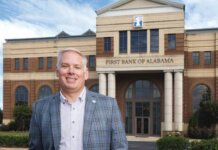
Paper paychecks are long gone. Today’s bank customers — especially young ones — may never even visit their local branch.
Demands on the banking industry to keep digital offerings current are intense. Banks must provide the latest online features with in-person help when customers want it. Six Alabama bankers discuss how they balance both worlds.
Regions Bank
Andy Hernandez, chief digital officer at Birmingham-based Regions Bank, says financial guidance and the latest technology are top needs for young customers.
“We know many of them grew up with technology and have expectations of being able to leverage technology to meet their banking needs,” he says.
Regions continues to make investments in the digital space to meet customers’ expectations. The banking chain prides itself on personal attention, too.
“Working with a bank like Regions that has a local branch presence provides a number of benefits, including access to bankers who can serve as in-person financial education resources,” Hernandez says.
“Financial wellness is a top priority at Regions, and through our no-cost Greenprint personalized plan that often starts with a conversation with a Regions banker at a branch, we are able to connect more people to resources that meet their financial goals.”
Regions aims for consistency and a seamless experience between digital platforms and the local branch, he says. Customers can manage banking tasks online or visit a brick-and-mortar location when they prefer in-person assistance.
Features like mobile banking are now an expectation, Hernandez says. As a result, Regions is continually upgrading its app for optimum functionality.
River Bank and Trust

Marcia Johnson is vice president and director of marketing and communications for River Bank and Trust in Prattville.
She sums up what all community bankers emphasize: “Relationships matter.”
“When clients visit our office in person, their interactions with team members enhance their financial lives,” she says. “We get to know them and become attuned to their preferences and goals.”
River Bank gives customers personal attention and expertise, Johnson says. Clients appreciate having someone to call or visit.
“And of course, they enjoy the hospitality, from freshly baked cookies in our lobbies to having their windshields washed in our drive-throughs,” she says.
Individuals can make check deposits, transfers, payments and even apply for loans online. In-person visits typically involve cash, she says. Business clients have access to remote deposit, ACH origination, e-bill pay and lockbox solutions.
“With mail fraud on the rise, businesses and individuals should limit mailing check payments to protect their account information,” she advises.
Local banks have less red tape, she suggests.
“We often provide faster decision-making on loan applications and the potential for better rates and terms due to our focus on relationships.”
To attract young customers, Johnson says, they offer a range of services like mobile check deposit, digital wallets and person-to-person payments.
Bank Independent
Kelly Burdette is senior vice president for digital and product at Bank Independent in Florence.
Bank Independent has what he calls a “high-tech, high-touch model” — “touch” meaning the personal touch.
“You can walk in and be with people that know you and live in your community,” Burdette says, and who shake your hand and look you in the eye. That experience is preferable to being sent to a “robot,” he says.
“One of Bank Independent’s strategic objectives is to provide the same service in branch and online as much as possible,” Burdette says, with an emphasis on security.
With customers now in 35 states, Bank Independent has “established a sales office that is dedicated to our digital customers,” he says.
Attracting young customers requires the same attention to detail.
“We must have the highest quality digital tools and the same level of service and support behind the screen, too,” he says.
With digital signatures, direct and mobile deposit, a local call center and secure, digital payments like debit cards and the Zelle network, it’s possible for a “digital native” to never visit a branch in person, Burdette says.
MidSouth Bank
Doing business face-to-face has some advantages, says Mason Morrow, president of MidSouth Bank in Dothan.
“With a stronger sense of trust and familiarity as well as the potential for flexible lending and account options, customers can be better served by tailored solutions rather than pre-packaged products,” he says.
Almost any bank business can be handled online these days, but Morrow says those that involve “larger sums of money, complex financial decisions like selecting the best loan product for a business or home purchase, or situations requiring in-depth explanations might be better handled through a trip to the bank or at least a phone call with your banker.”
Young customers, in particular, look for products and services that can be managed online, Morrow says, with 24/7 account access.
All customers can use local banks to take advantage of regional opportunities and the ability to speak with a teller, he notes. Another advantage is to “secure their information through trusted institutions, which are audited and reviewed regularly for compliance.”
“Each bank’s online offerings may vary, but customers can explore the bank’s website and online banking portal to understand what specific tasks can be managed online while still maintaining their connection to the bank,” Morrow says.
Local banks have a “commitment to the progress of the area,” he adds.
United Bank
Kendell Lewis is executive vice president and chief technology and innovation officer at United Bank in Atmore. Justin Jennings is the executive vice president and chief retail officer.
Both executives say they attract young people by continuously evaluating online products and services.
“New, young customers bank when and where convenient for them, and we provide them with that experience safely,” says Lewis. “Young people often multi-task and need to transfer money, pay a bill or open a new account while they wait in line for carpool.”
Customers who need advice can message from their mobile app.
Doing business at a local bank is important because “the staff in the local branches usually live in the communities they serve,” says Jennings. “The staff understands the community dynamic and economics. This allows the local branch to develop services and business practices that better fit their own communities,” he adds.
Working with a local banker fosters a relationship that can help customers reach their financial goals.
Almost anything can be done online, but “the customer should choose which types of transactions they are comfortable with, and the bank’s job is to meet them where they are comfortable,” Jennings says.
A customer could fill out a loan application online but go to the branch for closing, for example.
“We offer a hybrid module, and the customer makes the choice,” Lewis says.
Merit Bank

David Kimrey is executive vice president at the new Merit Bank in Huntsville. He, too, emphasizes relationships in a digital environment.
“Electronic banking has made banking more efficient and provides consumers with more options, but being able to combine that technology with personal service is the ultimate advantage,” Kimrey says.
Young people want the best digital tools, he says, but a personal banker can “analyze the unique needs of a young customer saving for college or their first home purchase.”
A strong digital platform “can make physical trips to the branch obsolete,” Kimrey says. “Technology has paved the way for remote banking to handle most, if not all, transactions.”
For that reason, cybersecurity is crucial.
“If your bank offers real-time monitoring tools and alerts, you should engage those tools so you are notified immediately of any suspicious activity,” Kimrey advises.
“By using your bank’s online options for transferring funds and paying bills, you get the added security measures provided by your bank — passwords, encryption, security alerts, automatic signoff, etc. — that helps to reduce the risk of fraud,” he says.
Deborah Storey is a Huntsville-based freelance contributor to Business Alabama.
This article appears in the October 2023 issue of Business Alabama.



